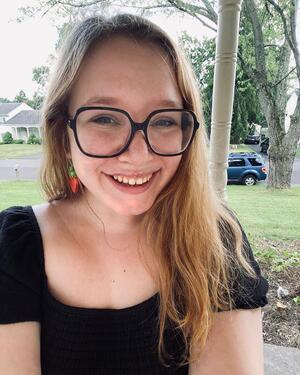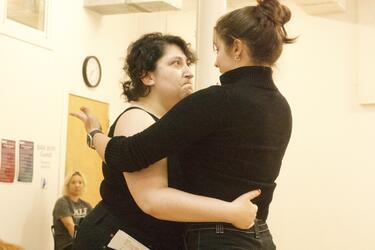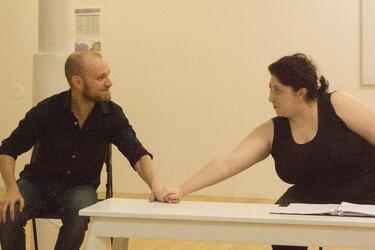7 Questions for Playwright Sarah Jae Leiber
Sarah Jae Leiber is a writer based in New York City, and a regular contributor to JWA's digital publication.
Sarah’s play, the old jew who begat scrooge, on his deathbed, won the Jewish plays project’s on one foot ten-minute play contest. It was written In December of 2021, following a two-day workshop with Pulitzer Prize-winning playwright Paula Vogel, and was also chosen out of over 50 plays to be read in a festival at McCarter Theatre Center.
Her first full-length play, PLEASE LAUGH, was a semifinalist for the 2024 Eugene O’Neill National Playwrights Conference. It received a reading at Pete’s Candy Store in the winter of 2023, and will open at The Tank NYC on Oct. 24, with additional shows on Oct. 25 and 30. JWA recently sat down with Sarah to discuss the show.
Emma Breitman: How did you first get interested in playwriting?
Sarah Jae Leiber: I was a weird little girl who read and wrote a lot of fan fiction, and it drove me crazy when people couldn’t get the characters’ voices right. I grew up performing and also downloading thousands of hours of theatre, film, television, and music into my brain. When I went away to theatre school, I realized I didn’t love or want to pursue acting, which wasn’t heartbreaking because I simultaneously discovered I loved putting words in people’s mouths more than I loved trying to say them onstage. I’d always loved writing, but I fell in love with writing plays that allowed me to express myself and tell stories I’d want to watch.
EB: What inspired you to write PLEASE LAUGH?
SJL: I grew up watching Conan O’Brien, including nearly every episode of his Tonight Show, and I was radicalized when that vulgar Jay Leno betrayed him and took back his spot. I was assured by people older and smarter than me that Leno was funny, but I didn’t see light in his eyes. I just saw blood. The best late night hosts, to me, are good interviewers who are funny and humble enough to become the butt of the joke, have a real conversation, and make their celebrity guests look their shiniest. The worst late night hosts are cloying, power-hungry bottom-feeders. They are charming, presentational, and non-threatening enough to package glorified PR for eager celebrity guests, but they themselves bring nothing to the table. They’ll stab you in the back, social climb, and rub elbows with fascists when that’s in style. When I write plays about pop culture, I classify it as idolatry—I’ll tell you this play is about specific late night hosts if you ask me in person, but it’s just as much about The Late Night Host as an American cultural icon, and how late night shows perpetuate systemic abuse within the entertainment industry. Watch any clip of Britney Spears, Lindsay Lohan, or Courtney Love on any late night show and be dismayed at how cruel these guys can be to people they’re supposed to be building up.
EB: What role does Jewishness play in PLEASE LAUGH?
SJB: There is a character in PLEASE LAUGH who has changed their name to avoid being detected as Jewish as they rise the ranks of the entertainment industry. Many actors from many ethnic groups change their names to sound “star-like,” and stars need to appeal to a nebulous middle American, white, Christian audience. Ramón Estévez becomes Martin Sheen, Winona Horowitz becomes Winona Ryder. It’s one of my strongest arguments against “the Jews control Hollywood.” I understand the historical context, and I get why people do it; it just also really bums me out. There can be enormous power in a person choosing their own name, but when the change hides who you are instead of celebrating the person you’ve chosen to be, it’s pretty soul-destroying. I don’t necessarily think the Jewish character in PLEASE LAUGH notices their soul eroding after they make that change, but I hope the audience does.
EB: The show was a finalist at The Loom New Works Festival, and a semi-finalist at the SheNYCArts Festival and National Playwrights Conference. How have those accolades impacted the production's evolution?
SJL: It has given me a lot of confidence! The new play development process is so difficult and long, and there are fewer opportunities than one would think to truly sit back and chill while a team of producers brings your work to light. PLEASE LAUGH has been the bridesmaid but not the bride enough times for me to know that people who have read the play like it and appreciate it, even if the production or development opportunity ultimately panned out for another writer who, I’m sure, has been the bridesmaid but not the bride just as many times. In the meantime, I have learned a lot from just creating the opportunities that I’m waiting for. I’m co-producing this run of PLEASE LAUGH with Jack McManus (who also directs the play!) and Sean Swenson, and I’m incredibly proud of the amazing team we’ve assembled to make it a reality.
EB: Are there any writers, histories, or traditions that were especially inspirational to you when writing Please Laugh?
SJL: The Jameses of Television: Jimmy Fallon/Kimmel, James Corden, and, spiritually, Ellen DeGeneres. Conan, Leno, David Letterman, Seth Meyers, Stephen Colbert, Johnny Carson, Arsenio Hall, John Oliver, Dick Cavett, Joan Rivers, Carol Burnett, Ed Sullivan. Sarah Ruhl, Mara Nelson Greenberg, Kimberly Belflower, Tennessee Williams. Todd Haynes, Jordan Peele, Carrie Fisher, Nora Ephron, Mike Nichols, Garry Shandling, David Chase, Rachel Bloom, Eve Babitz (retroactively), Amy Sherman Palladino (perpetually), Aaron Sorkin (unfortunately). Krusty the Klown, Fozzie Bear, and Saul Goodman. #MeToo and #FreeBritney and anyone in entertainment who has ever gone on strike for fairer pay and practices. Bill Hader and Barry. Martin Scorsese’s The King of Comedy, but not in a Joker way.
EB: Power dynamics play a big role in the show. What conversations about power do you hope PLEASE LAUGH engages with?
SJL: I hope people think about failing upwards, and who exactly gets to do that. The play is mainly about whiteness and maleness as toxic, self-perpetuating cycles—it’s about how nearly every industry is set up to cater to the white dude, who these systems consider politically neutral. Like, why haven’t we as a culture embraced a non-white late night host for as long a tenure as any of these Jameses of Television? What does it say about Hollywood that the guy from The Man Show got to grow into a household name (and, now, a kind of national hero?), and neither a woman nor a person of color has ever been permanently trusted with the keys to one of the legacy late night shows? American late night reflects who is allowed the space to develop, and who is allowed to be unfunny now on the promise that they’ll be funny later; it also reflects a larger struggle for talented non-white, non-men to be seen as institutional leaders and worthy investments. I also hope people think about what Hollywood demands from young women, especially young women of color, and how easy it is for young, vulnerable people to be publicly abused.
EB: What's next for PLEASE LAUGH?
SJL: Additional production opportunities, I hope! I would love to keep this incredible cast and crew employed for as long as I can. I will literally always work with actors like Abby Gumpper, Mackenzie Kwok, Maggie Metnick, Sevrin Willinder, and Libby Yowell; a director like Jack; a stage manager like Naira Sarin Jain; a fight and intimacy coordinator like Natalia Mar Urzua; a costume designer like Alex Church-Gonzales; a props designer like Nathaniel Stornelli; and a lighting designer like Sam Wise.









